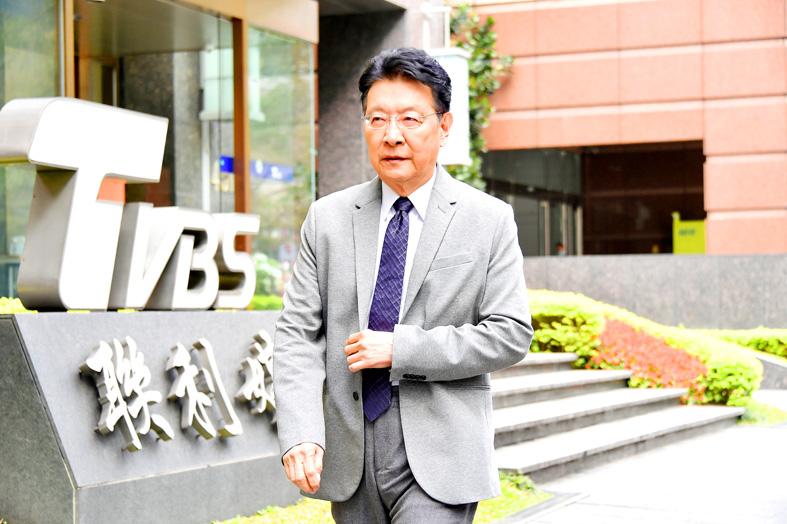Broadcasting Corp of China chairman Jaw Shaw-kong (趙少康) yesterday said that the Chinese Nationalist Party (KMT) “should not follow the Democratic Progressive Party’s [DPP] direction,” after KMT Chairman Johnny Chiang (江啟臣) had said that China posed a threat to Taiwan.
Chiang was quoted by Reuters as saying during an interview that China’s “one country, two systems” formula for an unification with Taiwan “has no market” in the nation.
Chiang also described China as the major threat to Taiwan, Reuters reported.

Photo: Tu Chien-jung, Taipei Times
Jaw, who has expressed interest in running for KMT chairman this year and in the 2024 presidential election, wrote on Facebook that Chiang’s view on China was inaccurate.
“As long as cross-strait relations are frozen, mainland China is only potentially a major threat to Taiwan,” Jaw wrote.
Jaw wrote that President Tsai Ing-wen (蔡英文) had an “anti-China attitude” and would engage in “Boxer Rebellion-like provocation” across the Taiwan Strait.
China is “potentially Taiwan’s biggest source of profit,” he added.
Later yesterday, Jaw told reporters that Taiwan should not “make China angry,” because it has a powerful economy and larger military.
Asked whether Chiang was trying to paint the KMT as opposing communism and unification, Jaw said that the KMT should distinguish itself from the DPP.
“If the KMT follows the DPP ... voters would just vote for the DPP because there would not be any use for the KMT,” he said.
“The DPP is feeding fantasy to the people and causes tensions across the Strait, so why should we learn from them?” Jaw said.
Asked whether he opposes Chiang’s position on China, Jaw said that he only responded to Chiang’s latest statement and is not familiar with the position he expressed over the years.
Taiwan last year had a trade surplus with China of US$140.5 billion, or twice the general budget of the government, he said.
“If this money is gone, what would happen to the stock market? What would happen to Taiwanese society?” Jaw said.
Jaw said that the DDP is to blame for the situation across the Strait.
“While China should exercise self-restraint, Taiwan should not be poking China all the time, telling Beijing to hit us,” he said.

The manufacture of the remaining 28 M1A2T Abrams tanks Taiwan purchased from the US has recently been completed, and they are expected to be delivered within the next one to two months, a source said yesterday. The Ministry of National Defense is arranging cargo ships to transport the tanks to Taiwan as soon as possible, said the source, who is familiar with the matter. The estimated arrival time ranges from late this month to early next month, the source said. The 28 Abrams tanks make up the third and final batch of a total of 108 tanks, valued at about NT$40.5 billion

A group from the Taiwanese Designers in Australia association yesterday represented Taiwan at the Midsumma Pride March in Melbourne. The march, held in the St. Kilda suburb, is the city’s largest LGBTQIA+ parade and the flagship event of the annual Midsumma Festival. It attracted more than 45,000 spectators who supported the 400 groups and 10,000 marchers that participated this year, the association said. Taiwanese Designers said they organized a team to march for Taiwan this year, joining politicians, government agencies, professionals and community organizations in showing support for LGBTQIA+ people and diverse communities. As the first country in Asia to legalize same-sex

Travel agencies in Taiwan are working to secure alternative flights for travelers bound for New Zealand for the Lunar New Year holiday, as Air New Zealand workers are set to strike next week. The airline said that it has confirmed that the planned industrial action by its international wide-body cabin crew would go ahead on Thursday and Friday next week. While the Auckland-based carrier pledged to take reasonable measures to mitigate the impact of the workers’ strike, an Air New Zealand flight arriving at Taipei from Auckland on Thursday and another flight departing from Taipei for Auckland on Saturday would have to

MOTIVES QUESTIONED The PLA considers Xi’s policies toward Taiwan to be driven by personal considerations rather than military assessment, the Epoch Times reports Chinese President Xi Jinping’s (習近平) latest purge of the Chinese People’s Liberation Army (PLA) leadership might have been prompted by the military’s opposition to plans of invading Taiwan, the Epoch Times said. The Chinese military opposes waging war against Taiwan by a large consensus, putting it at odds with Xi’s vision, the Falun Gong-affiliated daily said in a report on Thursday, citing anonymous sources with insight into the PLA’s inner workings. The opposition is not the opinion of a few generals, but a widely shared view among the PLA cadre, the Epoch Times cited them as saying. “Chinese forces know full well that